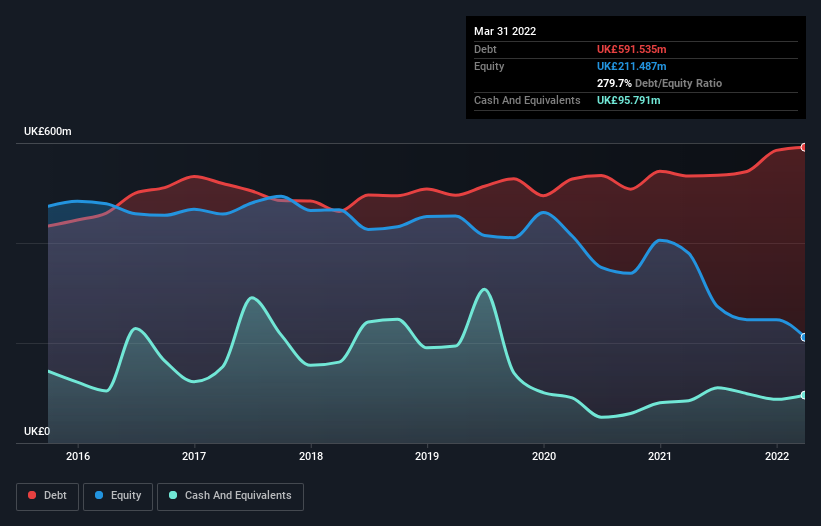- United States
- /
- Entertainment
- /
- NYSE:MANU
Does Manchester United (NYSE:MANU) Have A Healthy Balance Sheet?

The external fund manager backed by Berkshire Hathaway's Charlie Munger, Li Lu, makes no bones about it when he says 'The biggest investment risk is not the volatility of prices, but whether you will suffer a permanent loss of capital.' It's only natural to consider a company's balance sheet when you examine how risky it is, since debt is often involved when a business collapses. We can see that Manchester United plc (NYSE:MANU) does use debt in its business. But the real question is whether this debt is making the company risky.
What Risk Does Debt Bring?
Debt assists a business until the business has trouble paying it off, either with new capital or with free cash flow. Part and parcel of capitalism is the process of 'creative destruction' where failed businesses are mercilessly liquidated by their bankers. However, a more frequent (but still costly) occurrence is where a company must issue shares at bargain-basement prices, permanently diluting shareholders, just to shore up its balance sheet. By replacing dilution, though, debt can be an extremely good tool for businesses that need capital to invest in growth at high rates of return. When we examine debt levels, we first consider both cash and debt levels, together.
Check out our latest analysis for Manchester United
What Is Manchester United's Net Debt?
As you can see below, at the end of March 2022, Manchester United had UK£591.5m of debt, up from UK£533.8m a year ago. Click the image for more detail. However, because it has a cash reserve of UK£95.8m, its net debt is less, at about UK£495.7m.

How Healthy Is Manchester United's Balance Sheet?
Zooming in on the latest balance sheet data, we can see that Manchester United had liabilities of UK£464.0m due within 12 months and liabilities of UK£636.4m due beyond that. Offsetting these obligations, it had cash of UK£95.8m as well as receivables valued at UK£104.2m due within 12 months. So it has liabilities totalling UK£900.5m more than its cash and near-term receivables, combined.
This deficit is considerable relative to its market capitalization of UK£1.50b, so it does suggest shareholders should keep an eye on Manchester United's use of debt. Should its lenders demand that it shore up the balance sheet, shareholders would likely face severe dilution. When analysing debt levels, the balance sheet is the obvious place to start. But it is future earnings, more than anything, that will determine Manchester United's ability to maintain a healthy balance sheet going forward. So if you want to see what the professionals think, you might find this free report on analyst profit forecasts to be interesting.
Over 12 months, Manchester United reported revenue of UK£559m, which is a gain of 16%, although it did not report any earnings before interest and tax. That rate of growth is a bit slow for our taste, but it takes all types to make a world.
Caveat Emptor
Over the last twelve months Manchester United produced an earnings before interest and tax (EBIT) loss. To be specific the EBIT loss came in at UK£77m. When we look at that and recall the liabilities on its balance sheet, relative to cash, it seems unwise to us for the company to have any debt. So we think its balance sheet is a little strained, though not beyond repair. However, it doesn't help that it burned through UK£6.3m of cash over the last year. So suffice it to say we do consider the stock to be risky. For riskier companies like Manchester United I always like to keep an eye on whether insiders are buying or selling. So click here if you want to find out for yourself.
If, after all that, you're more interested in a fast growing company with a rock-solid balance sheet, then check out our list of net cash growth stocks without delay.
If you're looking to trade Manchester United, open an account with the lowest-cost platform trusted by professionals, Interactive Brokers.
With clients in over 200 countries and territories, and access to 160 markets, IBKR lets you trade stocks, options, futures, forex, bonds and funds from a single integrated account.
Enjoy no hidden fees, no account minimums, and FX conversion rates as low as 0.03%, far better than what most brokers offer.
Sponsored ContentNew: Manage All Your Stock Portfolios in One Place
We've created the ultimate portfolio companion for stock investors, and it's free.
• Connect an unlimited number of Portfolios and see your total in one currency
• Be alerted to new Warning Signs or Risks via email or mobile
• Track the Fair Value of your stocks
Have feedback on this article? Concerned about the content? Get in touch with us directly. Alternatively, email editorial-team (at) simplywallst.com.
This article by Simply Wall St is general in nature. We provide commentary based on historical data and analyst forecasts only using an unbiased methodology and our articles are not intended to be financial advice. It does not constitute a recommendation to buy or sell any stock, and does not take account of your objectives, or your financial situation. We aim to bring you long-term focused analysis driven by fundamental data. Note that our analysis may not factor in the latest price-sensitive company announcements or qualitative material. Simply Wall St has no position in any stocks mentioned.
About NYSE:MANU
Manchester United
Operates a professional sports team in the United Kingdom.
Very low with weak fundamentals.
Market Insights
Community Narratives




